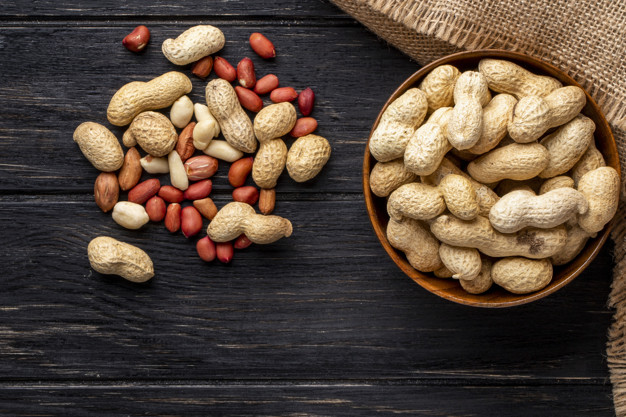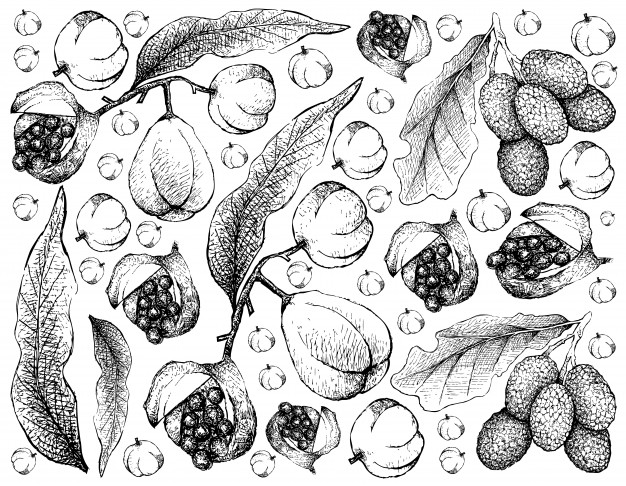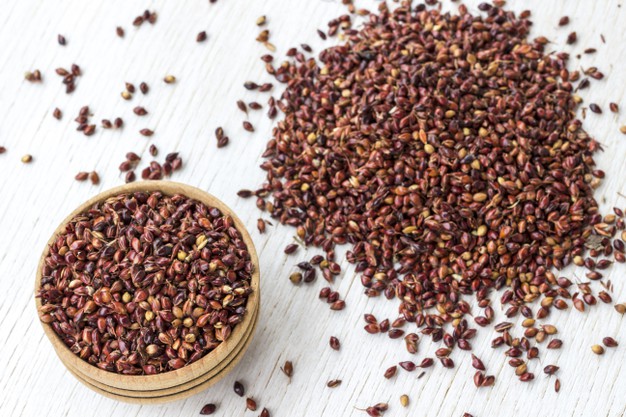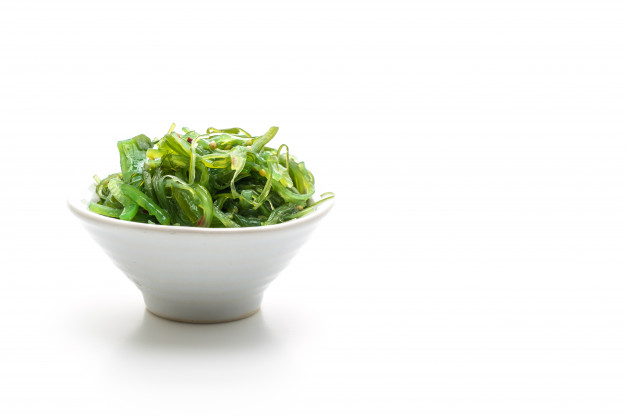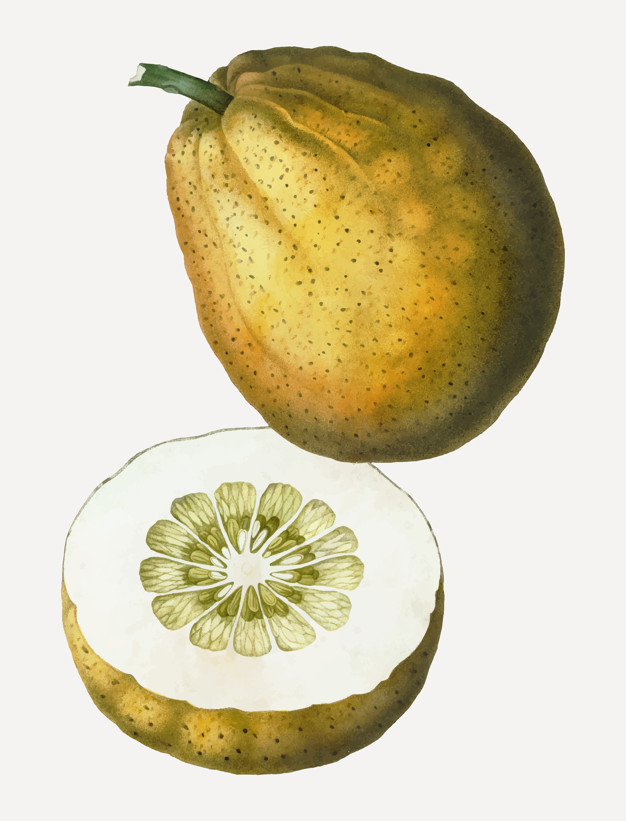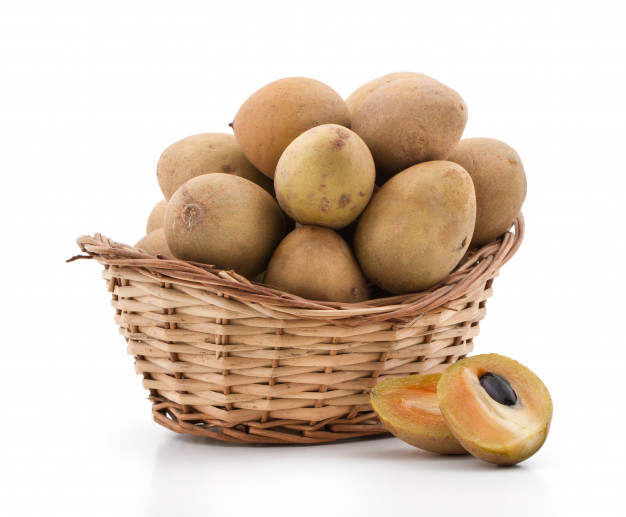Peanut is a nutrient dense, tasty nut belongs to Arachis genus and Fabaceae family. It has been traditionally used for several therapeutic and culinary purposes.
Nutritional profile
- It contains desirable amount of carbohydrates and dietary fibres
- It is considered as a good source of protein and contains various imperative amino acids thus consumption of peanut is thought to be extremely useful for vegans as it contributes good quality plant proteins
- It also contains fat especially composed of saturated fat, monounsaturated fat, and polyunsaturated fat but does not contain any trans fat
- On its oxidation, it provides desirable amount of energy as it contains pleasing amount of carbohydrates and fats
- It contains numerous micronutrients, which include Vitamin B1, B2, B3, B6, B7, B9, Vitamin E, calcium, phosphorus, iron, copper, manganese, sodium, potassium and magnesium
Imperative plant compounds found in peanut and their role on health
It is composed of various imperative plant compounds that play several roles in human body such as –
- Resveratrol – it is an antioxidant and plays significant role in decreasing the prevalence cardiovascular disease as well as cancers
- Phytic acid – it is another important component found in peanut exerts antioxidant activity that helps to decrease the concentration of free radicals and reactive oxygen species in body thus protects the body from their detrimental effects. It also acts as the main storage form of phosphorus. It may also impair the absorption of zinc and iron
- p-Coumaric acid – it is a polyphenolic compound, considered as one of the main antioxidant of peanut
- Phytosterol – it is another important plant compound of peanut especially found in peanut oil, plays significant role in decreasing blood cholesterol concentration by inhibiting the absorption of cholesterol through intestinal epithelial cell
- Isoflavones – these are a class of polyphenols that exert antioxidant activities and offers nutraceutical activities too

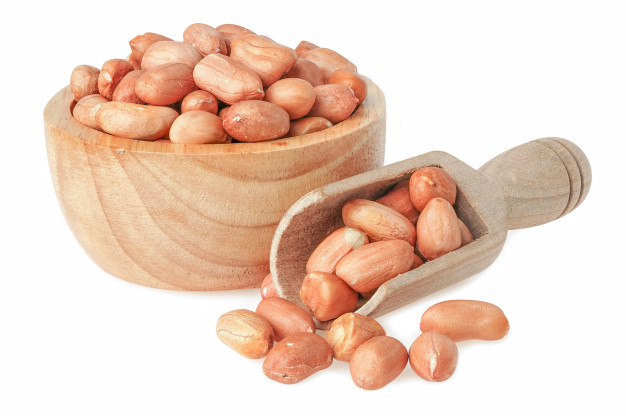
Health benefits
Role on nervous system
- B vitamins play vital role in improving brain health and activity and being a good source of B vitamins, peanut is considered as an imperative substance for improving the overall health of nervous system
- Its phytonutrient components, antioxidants and plant based proteins are responsible for protecting brain from oxidative damages hence decreases the susceptibility of developing neurological disorders
- Its consumption is also very effective for strengthening cognition
- It helps to improve memory as well
Role on skeletal system
- Consumption of peanut is extremely useful for maintaining a healthy skeletal system as it contains all those nutrients, which are essentially required by the body for healthy bone formation
- Its calcium and phosphorus components help in bone mineralization thus play significant role in enhancing bone mass and density as a result lessen the risk of developing bone related disorders
- Its manganese component is also responsible for promoting the synthesis of those enzymes, which are needed for building strong bones
- We know that ageing is responsible for weakening several bones in body and while ageing bones also begin to lose their strength thus it is better to consume peanut for keeping the skeletal system healthy and strengthen even in old age

Role on eye
- Consumption of peanut is very helpful for improving overall eye health
- Zinc present in peanut plays imperative role in promoting the conversion of Vitamin A within body, which helps to protect the body from the harmful consequences of eye disorders caused by Vitamin A deficiency like night blindness, bitot’s spot, keratomalacia etc
- It helps to promote vision as well
Role on skin
- Its consumption is extremely useful for improving skin health
- Its B vitamin components especially Vitamin B3 plays imperative role in healthy skin formation
- Fat present in peanut helps to promote natural oil barrier action of skin
- Its antioxidant activity is also responsible for protecting the skin from free radical induced oxidative damages thus lessen the risk of developing dermal disorders and prevent ageing too
- It helps to moisturize the skin and also provides the skin a younger look
- It helps to improve skin glow as well
- It is also very effective for preventing wrinkles

Anti-inflammatory activity
- Polyphenolic compounds and oleic acid present in peanut exert potent anti-inflammatory activity that plays significant role in preventing inflammation
- It also helps in reducing swelling and pain
Anti-carcinogenic activity
- Micronutrient components especially Vitamin E, proteins and polyphenolic compounds of peanut play vital role in reducing the risk of cancers
- Resveratrol is an important compound found in peanut (mentioned above) exhibits strong antioxidant activity that helps in preventing oxidative stress within body thus lessen the prevalence of cancers as oxidative stress is considered as one of the most leading causes of carcinoma
Role on blood coagulation
Peanut contains significant amount of manganese, which helps in blood coagulation thus consumption of peanut is thought to be very useful for decreases the risk of heavy bleeding if injury occurred
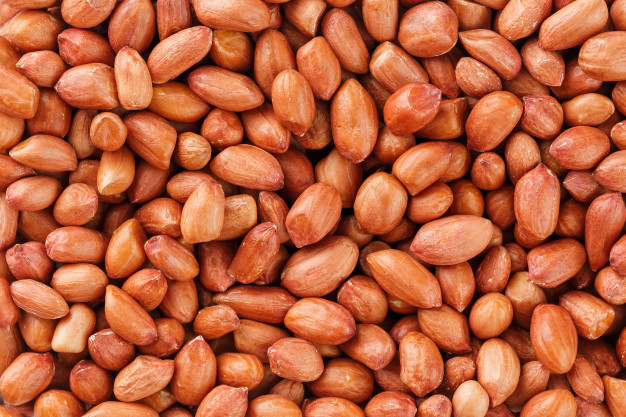
Therapeutic uses
It is widely used for preventing various health complications, such as –
- It helps to lessen the risk of developing cardiovascular diseases. Its unsaturated fatty acid contents and antioxidant activities are responsible for promoting cardiac health as well as functionality and also help to protect the heart from damages. Its potassium content helps to prevent hypertension. Its magnesium component also helps in maintaining normal heart beat
- It is also recognized as diabetic friendly food as it plays imperative role in regulating blood sugar level. Its fibre content helps to decrease the concentration of sugar in blood by delaying the absorption of glucose from intestinal epithelial cell thus reduces postprandial glucose load. Its magnesium content is also related with improving insulin response hence helps to improve the symptom of hyperglycemia
- Its fibre content helps in decreasing the concentration of cholesterol too, which ultimately reduces the prevalence of hypercholesterolemia
- It also helps in weight reduction. Its high protein and fibre contents make it an important weight reducing substance. It helps to provide a feeling of satiety hence decreases over eating, which helps in maintain energy balance thus facilitates weight reduction
- It is extensively used for improving hepatic health as it helps to promote the functionality of hepatic cell by preventing hepatic cell necrosis. Its cholesterol lowering effect also plays important role in reducing the prevalence of gall stones

Culinary uses
- It can be consumed raw or roasted or blanched or boiled or fried or in powdered form
- It can be used to prepare peanut butter as well
- It can also be used for preparing pies or cookies
- It can be added on the top of yogurt before consumption
- It can be tossed into salads
- It can be added to noodles too

General consideration of using peanut
- It is better to consume peanut with the thin skin as the skin contains various antioxidants and phytonutrients thus consumption of whole peanut is nutritionally beneficial
- It is better to preserve peanut in well manner as it is very much susceptible to be contaminated by Aspergillus flavus, which makes the nut unsafe for consumption as it produces aflatoxin
Risk factors
Though peanut has various health benefits but too much consumption of peanut may increase the risk of obesity due to its fat content. It may also develop allergic reactions. It contains anti-nutrients as well, which interfere with nutrient absorption thus it is always better to consume peanut in moderation.
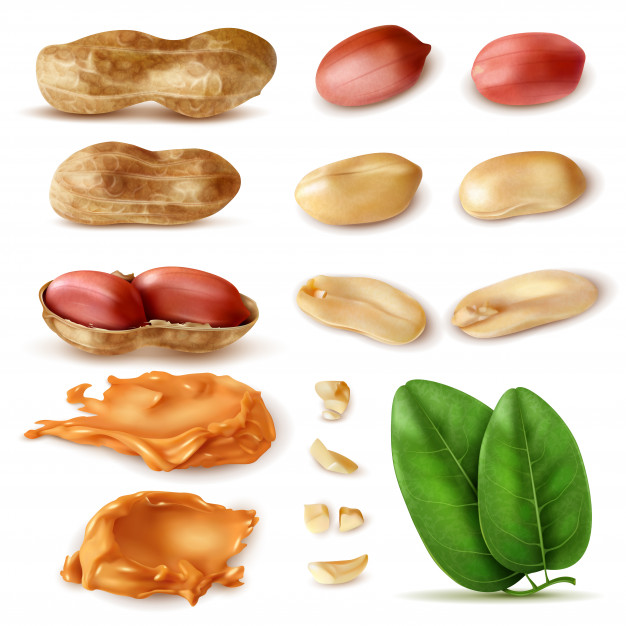
Source:
Chenault, K.D., Ozias‐Akins, P., Gallo, M. and Srivastava, P., 2009. Peanut. Compendium of Transgenic Crop Plants, pp.169-198.
Griel, A.E., Eissenstat, B., Juturu, V., Hsieh, G. and Kris-Etherton, P.M., 2004. Improved diet quality with peanut consumption. Journal of the American College of Nutrition, 23(6), pp.660-668.
Jones, J.B., Provost, M., Keaver, L., Breen, C., Ludy, M.J. and Mattes, R.D., 2014. A randomized trial on the effects of flavorings on the health benefits of daily peanut consumption. The American journal of clinical nutrition, 99(3), pp.490-496.
Moreno, J.P., Johnston, C.A., El-Mubasher, A.A., Papaioannou, M.A., Tyler, C., Gee, M. and Foreyt, J.P., 2013. Peanut consumption in adolescents is associated with improved weight status. Nutrition Research, 33(7), pp.552-556.
Suchoszek-Łukaniuk, K., Jaromin, A., Korycińska, M. and Kozubek, A., 2011. Health benefits of peanut (Arachis hypogaea L.) seeds and peanut oil consumption. In Nuts and seeds in health and disease prevention (pp. 873-880). Academic Press.
Toomer, O.T., 2018. Nutritional chemistry of the peanut (Arachis hypogaea). Critical reviews in food science and nutrition, 58(17), pp.3042-3053.
